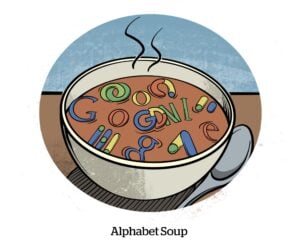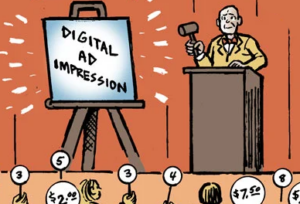The Google antitrust trial starting on Monday in Virginia is not about the company’s privacy practices.
Google is accused of allegedly operating a monopoly over the digital advertising market.
The ad trades have been feasting on the cache of unsealed emails, depositions, motions and other related documents released in the lead-up to the trial.
But the discovery process has also unearthed nuggets of information that aren’t directly related to the case, yet are no less fascinating.
For example, do you want to know how much Google spent on engineering to support ads safety and privacy for its display business? Or how Google salespeople were instructed to communicate Google’s approach to ads privacy? How about an awkward privacy-related chat between top Google executives?
Well then, read on.
Privacy peanuts
In a report written for defense by Dr. Mark Israel, Google’s go-to economic expert, there’s a brief section arguing that Google’s ability to implement privacy-related user protections is “inherently linked to its integration across the ad tech stack.”
A key piece of Google’s plan in court will be to counter the DOJ’s argument that operating an end-to-end platform is a recipe for monopoly. According to Google, the tight integration of its ad tech stack is good for security, privacy, efficiency and the user experience. Also, both Meta and Amazon have taken a similarly integrated approach, so why pick on Google? Or so the argument goes.
To support his contention that Google is in a better position to protect users because of its end-to-end setup, Dr. Israel mentions in passing that Google has spent more than $600 million overall between 2017 and 2022 on engineering expenditures for its ads safety and privacy initiatives.
Google started out by spending $36 million in 2017 and ramped that up to $182 million by 2022.
To be fair, $182 million is a good chunk of change, and $600 million over six years is nothing to sniff at.
However, it’s also worth pointing out that Google generated $110.9 billion in total revenue in 2017 and $283 billion in total revenue in 2022.
I’ll just leave those numbers there.
Talking points
This next exhibit provides a little peek behind the curtain into Google’s communications strategy.
The document, which is from June 2018, is designed to help Googlers in the sales org to “understand and communicate Google’s approach to user data privacy in ads and respond reactively to customer questions about recent industry events on this topic.”
Among other things, Googlers are advised to “think like an owner and prepare for all the possibilities – including a skeptical member of the press looking for a scoop.” (I feel seen.)
Employees are also provided with a series of “Facebook-specific reactive talking points” in case anyone were to ask about sensitive topics like Cambridge Analytica or the removal of partner categories.
But perhaps the most interesting part of the document is a chart with recommendations for how to modify the language salespeople use in their collateral.
Rather than “target users,” “targeting” or “track,” for example, the document suggests using softer, more euphemistic language, like “find users,” “reach users,” “engage users,” “show ads to users,” “make ads more relevant” or “deliver more relevant ads.”
Not bad advice, honestly. Words matter, and who wants to be tracked and targeted?
[End of chat]
Meanwhile, Google appears highly sensitive to the fact that Apple is better at deflecting any negative press about its approach to privacy than Google has been.
See this excerpt from a January 27, 2021, chat conversation between Google executives, which came to light as one of multiple examples of Google employees “spoliating” chats. (In legal jargon, spoliation refers to the destruction of or failure to preserve evidence relevant to a legal case.)
The chat begins with Prabhakar Raghavan, Google’s SVP of advertising and commerce quoting from a semi-critical article published that day by The New York Times about Apple’s then-new Privacy Nutrition Labels for iOS apps: “The result is that the data practices of Apple’s apps are less upfront. If Apple wants to lead the privacy conversation, it can set a better example by making language clearer – and its labeling program less self-serving.”
Cathy Edwards, Google’s VP of engineering responds: “I worry that this will be like Apple and China – they are just better at handling this press (and their employees) than we are, so won’t be so drawn into an ongoing story”
Raghavan: “well then we just need to get a lot better”
(around 25 seconds pass)
Raghavan: “ugh pl stop this chat, for some reason History is on”
[end of chat]
🤷♀️
🙏 Thanks for reading! I’ll be in Virginia for the first week of the Google ad tech antitrust trial. Hopefully. Unless I’m prevented by a force stronger than my own. As always, feel free to drop me a line at [email protected] with any comments or feedback.













